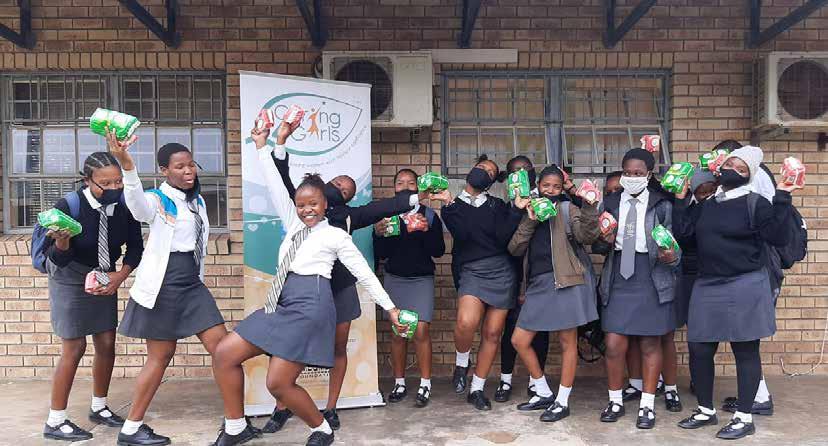
5 minute read
Shift towards sustainable mining increases
RESPONSIBLE MINING
SHIFT TOWARDS SUSTAINABLE MINING INCREASES
Advertisement
The mining industry’s shift towards a greener, more sustainable and more community-oriented business model is accelerating as mining groups seek to maintain their social licence to operate and position themselves for long-term growth.
By Nigel Beck & Mark Buncombe*
The continued focus on climate change and on the well-being of local communities, particularly in light of the Covid-19 crisis, has meant that many mining companies are responding by accelerating the reduction of carbon emissions and addressing social issues.
Anglo American, for instance, said in mid-2020 that it was pushing ahead with plans to convert its mine-haul trucks from diesel to hydrogen power. The group is launching a pilot project at its openpit Mogalakwena operation in South Africa. It has already taken delivery of its first fuel-cell truck and intends to produce ‘green’ hydrogen on-site using solar energy. BHP Billiton said early in 2021 that it had invested in a company seeking to manufacture steel in a far more environmental way than is the norm.
With the industry now acutely aware of the need to operate sustainably, Standard Bank has seen a significant rise in interest in sustainable finance products, which are used to fund improvements in a firm’s environmental, social and corporate governance (ESG) performance.
Targeting high-growth industries
The rise of electric vehicles, driven by consumer preferences for more environmentally friendly products, is expected to boost demand for minerals
RESPONSIBLE MINING
used in batteries and electric motors, such as lithium, graphite, copper, cobalt and nickel. Platinum group metals (PGMs) and rare-earth minerals are also expected to benefit, with the growing hydrogen economy providing an additional boost.
As the mining industry positions itself for this shift, it will play an important role in the transition to a more sustainable global economy. With 70% to 80% of the world’s available PGM resources sitting in South Africa’s Bushveld Complex and in Zimbabwe, Southern Africa will have a massive role to play in the decarbonisation of mining and the global economy.
In addition to this, mining houses are taking steps to minimise their own carbon footprints and better manage scarce water resources. The largest concern that the industry has is its ability to meet the increased demand for certain commodities in a sustainable way.
The adoption of new energy sources used in extraction and production, such as hydrogen and solar, is already in full swing. The deep investments in cleaner technologies often result in efficiency gains, which is good for business.
Regulators in South Africa are making it easier for mining houses to produce and procure their own energy. Given the country’s ongoing electricity supply issues, alongside its vast solar resources and advancements in technology, solar solutions are coming to the fore. And equipment manufacturers

RESPONSIBLE MINING
are positioning themselves to fulfil the needs of the industry.
Upweighting societal and governance considerations
Miners are also seeking to play a greater role in the communities in which they operate. As such, they are considering funding instruments such as social bonds to facilitate the development of employee housing and local infrastructure.
Social upliftment has become an important consideration in South Africa’s mining industry, given the country’s inequality and developmental challenges, which have been exacerbated by the Covid-19 pandemic.
The industry has already made significant strides in terms of improving safety records. And mining groups have leveraged their success with managing infectious diseases such as TB and ebola to effectively curb the spread of Covid-19, both within their workforces and the communities in which they operate.
In countries where healthcare systems have struggled to cope with the pandemic, mining houses have played a particularly large role in safeguarding communities. This has the benefit of promoting their own long-term sustainability.
Sustainable finance solutions – which tie the cost of funding to improvements in ESG performance – will play an important role in helping Africa’s mining industry to adapt and attract capital from an investor base that is becoming increasingly focused on sustainability.
Bankers, investors and other financiers are focusing more closely on the corporate governance pillar amid the pandemic, since supply chain disruptions and other challenges are testing management teams. Firms with stronger governance structures tend to manage these situations better, thereby reducing repayment risk and, ultimately, their funding costs.
Investors have become increasingly sophisticated in how they allocate capital. Boards and management teams are therefore spending considerable time on improving their ESG credentials, with a view to being re-rated by markets.
However, mining groups are prioritising different ESG pillars according to the risk profile of the commodities they produce and the geographies in which they operate. Ultimately, their efforts should be aligned to the various stakeholder groups they work alongside.
*Nigel Beck is head: Sustainable Finance and ESG at Rand Merchant Bank. Mark Buncombe is the former head: Mining and Metals at Standard Bank.

Mark holds a BBusSci (Hons) from the University of Cape Town
Nigel is an accomplished sustainable finance and ESG specialist with over 20 years’ global experience

SIYANDA BAKGATLA PLATINUM MINE
CREATING SHAREHOLDER VALUE AND SUPPORTING THE ECONOMY AND DEVELOPMENT OF THE REGION.
Employing about 5 200 fulltime employees and around 1 500 contractors, Siyanda Bakgatla Platinum Mine – known as Union Mine – is a producer of: • Platinum • Palladium • Rhodium • Iridium • Ruthenium • Gold • Chrome • Silver • Cobalt • Nickel • Copper.
We’re proud to have invested more than R60 million in our host communities through our Social and Labour Plan (SLP2), which focuses on infrastructure development, education and skills development, health, poverty alleviation, and enterprise development.




WE TAKE OUR COMMUNITY COMMITMENTS SERIOUSLY











